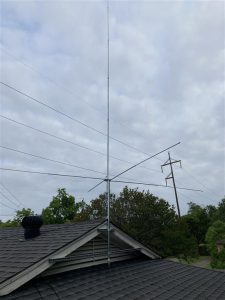By Chip Coker KD4C
Those who know me and my ham radio experience know that I love 10 Meters. Early in my ham career (and in the peak days of solar cycle 21), I would come home from school and turn on the radio to armchair copy of VK/ZL and South American stations on 10M SSB, just like they were next door. In between those booming signals, there was silence! No noise, no static, no foreign broadcast QRM, and (because this was before the ubiquity of computers and cell phones) no computer interference. So you would tune from S9 station to S9 station with almost nothing in between!
Then at nighttime (after the band had closed – although sometimes it didn’t), there was a local bunch that gathered on 28.650 MHz. Almost every evening, there would be 15-20 of us from all walks of life – a high school kid like me, young tech types like my friend KD4B that worked for IBM (we passed Extra on the same day), housewives, some “old” men in their 40s, and one very feisty grandmother – and we would just have this perpetual roundtable, talking about nothing and everything, until we got tired. And then we would do it all again the next night. All of us were within 10-15 miles “ground wave” of each other. Signals weren’t strong, but the noise was low enough that it didn’t matter. It was a very formative experience to me (a lowly high school kid) being accepted into that group as a peer, and it was the start to a lifetime of ham radio experiences on 10 Meters.
Fast forward to today. The start of a new solar cycle – probably not as good as cycle 21, but promising to be fun nonetheless! 10 meters is starting to cook on many days, and I needed a good antenna to take advantage of it!
My go-to antenna for the high bands has been a Hy-Gain 12-AVT trap vertical mounted on my roof. While the antenna has worked and served me well, it’s just a poor compromise on 10 meters. First of all, due to the trap layout, only the bottom 6 feet are active on 10 meters (the rest of the antenna having been “cut off” by the 10M trap). Second, with only (less than) a quarter wavelength active, the radiation angle is higher than what I wanted. Third, the antenna (as do most 1/4 wave direct-fed verticals) picks up a lot of static. I live in the shadow of a sometimes-noisy 62KV feeder line. I needed something better if I was to catch 10 meters at the peak of cycle 25.
Someone put an idea in my head to look at classic CB antennas (I think I’ll blame Callum M0MCX). Say what you will, but in the ’70s there were some hardcore CB’ers looking to squeeze every bit of radiation out of their whopping 4 watts of ERP. Who am I kidding, they were all running 50w bricks. Anyway, I digress. They did have some pretty good antennas, and some of these designs have stood the test of time.

I looked at several currently-offered 10-11-12M antennas, some of which are European (remember, 11 meters is a ham band in some Region 1 countries) and ran across references to the “Super Penetrator” by Hy-Gain. Thousands were sold in the ’70s. Hy-Gain has now been assimilated into the MFJ world, but the antenna has been re-issued as the Hy-Gain SPT-500. Ham Radio Outlet had one in stock in Plano (so no shipping!), so I gambled and bought one.
It was easy enough to assemble and tune, so I won’t spend any time on that. Now, to the things that I really like about this antenna:
- Height – The radiator is 22 feet tall. I think it’s technically a 5/8 wave – that’s 22 feet of radiator! Sure beats the poor 6 feet of 12-AVT metal before getting cut off by the 10m trap!
- Low Radiation Angle – Because this is much longer than a standard 1/4 wavelength radiator, the DX radiation angle is much lower.
- Broadband – It’s extremely broadband and less than 2:1 across the entire 10m band. Plus, it can be tuned for 12m and 6m using the internal tuner.
- Built-In Ground Radials – There are 4 horizontal full quarter-wave (108″) ground elements, so I don’t have to worry about having a suitable surface underneath it or worry about stringing ground elements.
- DC-Ground – The antenna is fed with a unique “hairpin” feed (no matching coil!) that is electrically grounded. This means that the antenna is extremely low static noise. I can confirm this on my FT-DX10 waterfall just by switching back and forth between this and the 12-AVT. Noticeable difference in the band noise.
- Easy To Mount – I just put it on a 5.5 foot fence post mast mounted to some unistrut on my eave, up about 20 feet.
Using this antenna has been a pleasure so far. Pretty much, if I can hear it I can work it. I consistently get FT-8 signal reports that are 2-10 units higher than what I send (if I see the other station at -10, it’s not uncommon for them to send me a -2 or higher). The low-noise aspect helps out also as I see stations at -20 and below.
The down side to this antenna is dedicating so much roof real estate to a single band vertical. But it will all be worth it if I can get some of the magic back like I had in Cycle 21. Anyone want to start a 10 Meter roundtable at night?
[This piece also posted to the Richardson Wireless Klub (RWK) Chawed Rag August 2022 newsletter]